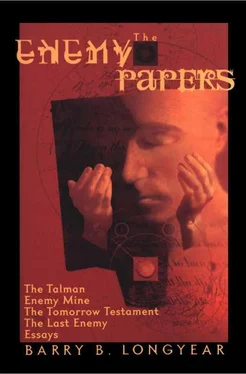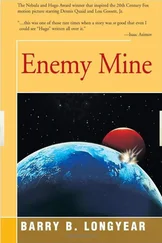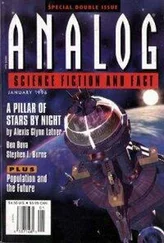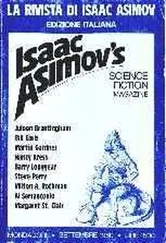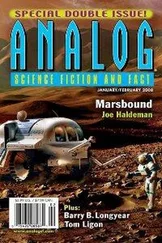The Way does not exist; only the ways we use and the ways we invent and choose. Talma is not The Way; talma is a way for finding ways."
Fragment: Shizumaat
"As do all creatures, we seek the comfort and the security of the safe path, its direction to be found through eternal knowns and indestructible verities. But to be creatures of choice, we must necessarily abandon the comfort and security of instinct, for all our knowns are probabilities, and all our truths are doctrines amendable when truer truths are presented."
KODA AYVIDA
The Story of Mistaan
It was Mistaan who invented writing and who first recorded The Myth of Aakva, The Story of Uhe, and The Story of Shizumaat, as told by Namndas and by Mistaan’s own observations of Shizumaat’s trial and execution. It was Mistaan who heard Shizumaat’s claim of another race existing in a far land; a race different from the Sindie.
Fragment: Mistaan
"Talma shows each one its path. But, as beings of choice, we can choose not to see the signs."
Fragment: Mistaan
"There are those who would fit the wanderer into a place in this Universe, and one seeking such a place might accept this. Moreover, one might find such a place already constructed and accept this as one’s own. However, places that are found are not for creatures such as us. To fit a unique being of choice into roles and places fabricated by others or found by chance is to diminish that being’s choices and its individuality. Each being of choice, who would remain so, must forge its own place."
KODA SCHADA
The Story of Ioa and Lurrvanna
The rule of Kulubansu, the overthrow and destruction of the Servants of Aakva, Ioa and the establishment of the first Talman Kovah. Lurrvanna takes over as master of the Talman Kovah. The first invasion of the Orange Ones. The rule of Rodaak the Barbarian, the Talman Kovah destroyed, the persecution of the Talmani.
Fragment: Ioa
"Nothingness is a tool of the mind: the useful naught of the mathematician, builder, and accounts keeper. Nothingness is not a state either of mind or of being. All that exists will always exist; all who exist will always exist. All that changes is form and the perception of form."
Fragment: Ioa
Consider the one who observes that which is around it then asks "What do these objects and events tell me?" Such is the way and the manner of life; such is the tool of those who would live. Consider, as well, the one who searches only through its mind to determine what is, and what is not, and then looks only to the objects and events that support its conclusions and says "This is truth." Such is the way and the manner of purposeless sacrifice; such is the tool of the mad, the criminal, and those who hunger for power.
Fragment: Lurrvanna
Lurrvanna looked up from its bandaged stumps and spoke to its masters and students: "The Talman is forbidden to us. The temple in which we study talma, our Talman Kovah, has been destroyed. The Talmani have been either murdered or frightened into hiding. Our writings earn their authors the loss of their hands. Rodaak and its soldiers would have The Talman disappear from memory.
"But memory is the refuge of the Talmani, and it is there where we shall hide The Talman from Rodaak. Fix the words into your minds; then take them, whisper The Talman to others, and have those others pass the words on to still others."
Fragment: Lurrvanna
"Time is our friend. In time, Rodaak and its police will no longer be. In time, we shall make known again the value of talma. In time, The Talman will again be written and the walls of a new Talman Kovah will stand upon these broken stones. In time, tomorrow will come."
KODA ITHEDA
Aydan and The War of Ages
The War of Ages between the Orange Ones, called the Lleghis, and the Sindie.
For over a thousand years the races war for control of the world. The rise of Aydan who turned war, then peace, into sciences. Aydan’s army and a peace of complex balances ends the War of Ages.
Fragment: Aydan
"Aydan," spoke Niagat, "I would serve Heraak; I would see an end to war; I would be one of your warmasters."
"Would you kill to achieve this, Niagat?"
"I would kill."
"Would you kill Heraak to achieve this?"
"Kill Heraak, my master?" Niagat paused and considered the question. "If l cannot have both, I would see Heraak dead to see an end to war."
"That is not what I asked."
"And, Aydan, I would do the killing."
"And, now, would you die to achieve this?"
"I would risk death as does any warrior."
"Again, Niagat, that is not my question. If an end to war can only be purchased at the certain cost of your own life, would you die by your own hand to achieve peace?"
Niagat studied upon the thing that Aydan asked. "I am willing to take the gamble of battle. In this gamble there is the chance of seeing my goal. But my certain death, and by my own hand, there would be no chance of seeing my goal. No. I would not take my own life for this. That would be foolish. Have I passed your test?"
"You have failed, Niagat. Your goal is not peace; your goal is to live in peace. Return when your goal is peace alone and you hold a willing knife at your own throat to achieve it. That is the price of a warmaster’s blade."
Fragment: Aydan
There will come to you at times a blinding vision that fills your eyes and mind, announcing itself as Truth. Step back and strike down this vision and beat it as though it were a brain-sucking monster.
Then, with it lying there limp, bent, and tarnished, if it still claims to be Truth, accept it with great caution, remembering that the most dangerous lies arrive in the most highly polished armor.
Fragment: Aydan
"Should the goal make honorable the means necessary to achieve that goal? Or does the honorableness of the means employed sanctify whatever goal is achieved through them? Or is right rooted in the honor of both means and ends? One choice makes the leader capable of leading a people at war. The other choice makes the leader capable of ruling a world at peace."
KODA HIVEDA
The Story of Tochalla
Against violent and almost successful opposition, Tochalla begins the movement to reassemble the Talmani and to rebuild the Talman Kovah.
Fragment: Tochalla
Tochalla told those who would listen about lessons and a discipline that had been crushed and forbidden five centuries before. In the intervening five hundred years, the surviving memories and fragments of talma had become things twisted by faulty memories and embellished by generations of the ignorant and the imaginative.
"We will take it all," wrote Tochalla. "We will gather in everything, much as Rhada did with the many versions of the Laws of Aakva, and we will examine, test, discuss, and challenge everything. If we are honest and mean only to serve truth, then what remains will be the truth of it."
Fragment: Tochalla
I look at a battlefield and see the combatants twisted in death, seemingly still battling in that existence beyond, and I see this knife before me and see an argument for joining the dead. It is so clear to the Talmanist, this wonderful future of health, prosperity, and freedom, and all that needs to be done is to protect this freedom. "Here is everything you need and want in this little box," I cry to the fighters. "All you need to do is open it!"
But first there must be a war to determine if the box should be opened, who should open the box, who should interpret the meaning of the contents, who should select the recipients of the gifts, who should distribute them, and who should tax them and at what percentage.
Читать дальше
